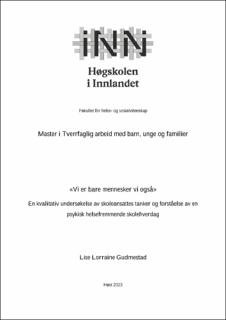Vi er bare mennesker vi også
Master thesis
Permanent lenke
https://hdl.handle.net/11250/3102028Utgivelsesdato
2023Metadata
Vis full innførselSamlinger
Sammendrag
Formålet med denne masterstudien har vært å undersøke hvordan skoleansatte jobber psykisk helsefremmende i skolehverdagen, og hvilke tiltak som gjøres i det forebyggende arbeidet. Bakgrunnen er at en har sett en økende trend av psykiske utfordringer hos barn og unge, spesielt det siste tiåret. Dette gjelder både i Norge og globalt sett. Dersom barn sliter med psykiske utfordringer på skolen, kan dette føre til nedsatt funksjonsevne og gå ut over trivsel, mestring og relasjon til andre. Skolen møter disse barna hver dag, og skoleansatte vil derfor være en viktig ressurs i å oppdage utfordringer, forebygge og tilrettelegge for at de skal kunne få det best mulig ut fra deres forutsetninger.
Problemstillingen for oppgaven har vært: «Hvordan jobber skoleansatte forebyggende for å styrke barns psykiske helse ved å legge til rette for at barna opplever et støttende og trygt miljø?»
Studien er gjennomført på bakgrunn av kvalitativ tilnærming med semistrukturert intervju. Det er gjennomført seks intervju. To av disse er utdannet lærere, én er utdannet barnevernspedagog, én er utdannet sosionom og to er utdannet barne- og ungdomsarbeidere. Disse møter barna i ulike situasjoner, både i skolefritidsordning og i undervisning. Samlet utgjør disse ett støtteapparat rundt barna i skolen.
Funn i studien viser at de ser på seg selv som sentrale aktører i helsefremmende arbeid med psykisk plager i skolen. Det ble hos samtlige vektlagt trygghet og gode relasjoner til voksne og barn, og det å gi hverandre tid i hverdagen til å bygge relasjoner. Fagarbeidere og miljøterapeuter jobber mer knyttet opp mot enkelte barn, og har mer tid til den enkelte enn det lærere som jobber mer på klassenivå. Det trekkes også frem viktigheten av god støtte og samarbeid fra kollega og ledelse. De ansatte føler seg trygge i jobben, men etterlyser kunnskap og samarbeid. Funn i studien er drøftet opp mot teorier som anerkjennelse, trygghet og relasjon. The purpose of this master's study has been to examine how school staff work to promote mental health in the everyday school environment and what measures are taken in the preventive work. The background is the increasing trend of mental health challenges among children, especially in the last decade, both in Norway and globally. If children struggle with mental health challenges at school, it can lead to reduced functioning and affect their well-being, coping, and relationships with others. The school encounters these children every day, and school staff are therefore important resources in identifying challenges, preventing them, and facilitating the best possible outcomes for them based on their circumstances.
The research question for the thesis has been: "How do school staff work preventively to strengthen children's mental health by creating a supportive and safe environment?"
The study was conducted using a qualitative approach with semi-structured interviews. Six interviews were conducted. Two of these interviewees are trained teachers, one is trained within child protection and child welfare, one is a trained social worker, and two are trained child and youth workers. These professionals interact with children in various situations, both in after-school programs and in teaching, collectively forming a support system around the children in school.
Findings in this study indicate that the participants see themselves as central actors in promoting mental well-being in school. All interview subjects emphasized the importance of safety and building good relationships with both adults and children, as well as dedicating time in daily life to building these relationships. The other professions work more closely with individual children and have more time for each child than teachers who work more at the classroom level. The importance of strong support and collaboration with colleagues and leadership is also highlighted. The staff members feel secure in their roles but express a need for more knowledge and collaboration. Findings from the study are discussed in relation to theories of recognition, safety, and relationships.
